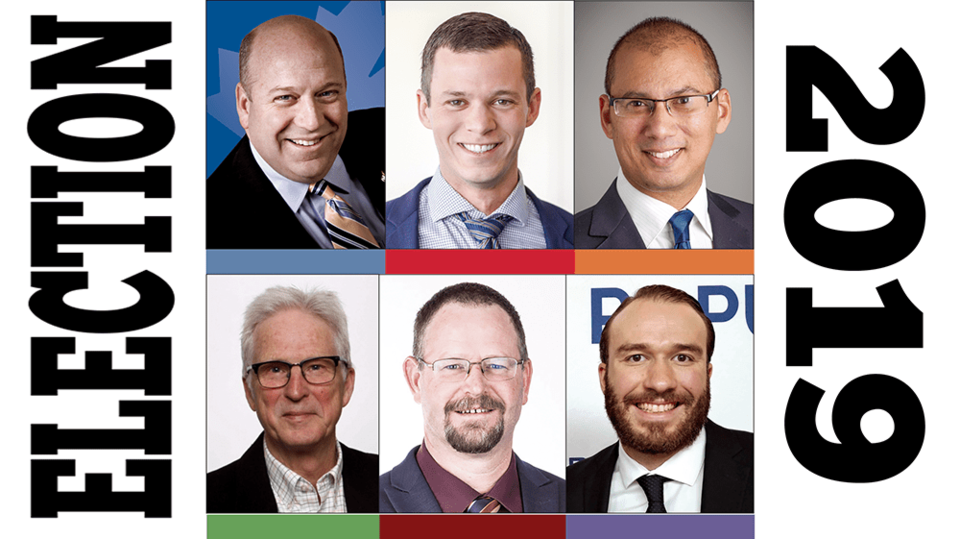In a bid to shed light on the candidates’ positions on a variety of issues specific to Niagara West residents, as well as to all Canadians, last week the Voice sent a brief questionnaire to each of the six candidates running to represent the riding in Ottawa.
Five primarily open-ended questions were followed by seven primarily issue-specific questions. We begin with the candidates’ responses to the open-ended questions, in alphabetical order by last name. (The assertions that follow are solely those of the candidates, and have not been fact-checked by the Voice.)
In your view, what is the most important issue facing Niagara West voters in this election?
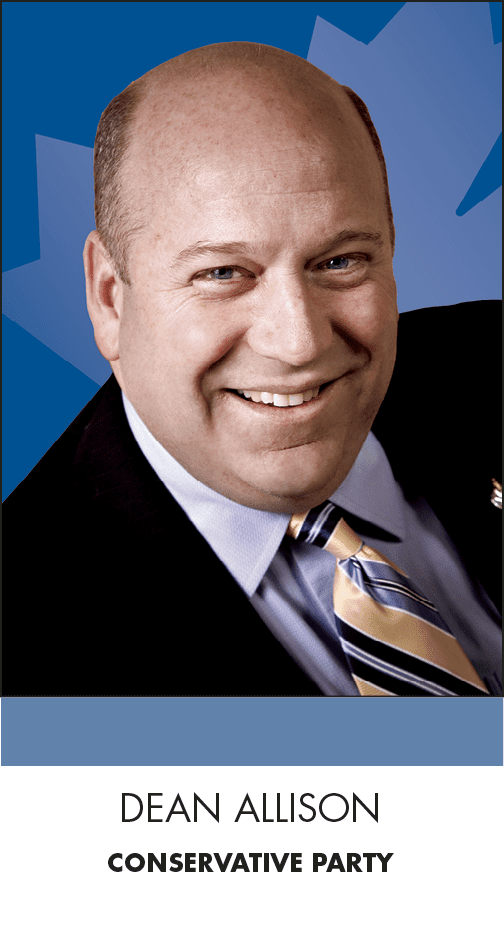 Dean Allison, Conservative Party of Canada (Incumbent)
Dean Allison, Conservative Party of Canada (Incumbent)
Without question, affordability. What I hear when I am out talking with residents at the doors, is that no matter how hard you work, or that you play by all the rules, there seems to be less and less money left over for you at the end of the month.
There are a number of things that a Conservative government will do when elected. Our government will protect our healthcare system and guarantee increased funding, we will protect our environment while removing the carbon tax, and we will provide more money for families, children, seniors, and small business.
In a rural riding like Niagara West, we do not have an option when it comes to transit. The current carbon tax is severely hurting individuals, families and businesses in our community.
In addition, the liberal government is projecting a $28 billion dollar deficit if re-elected and that does not even include the interest on our debt, or funding for a national pharmacare program that experts say could cost another $25 billion dollars a year, plus a host of many other un-costed campaign promises.
The reality of deficits is that you need to pay them back.
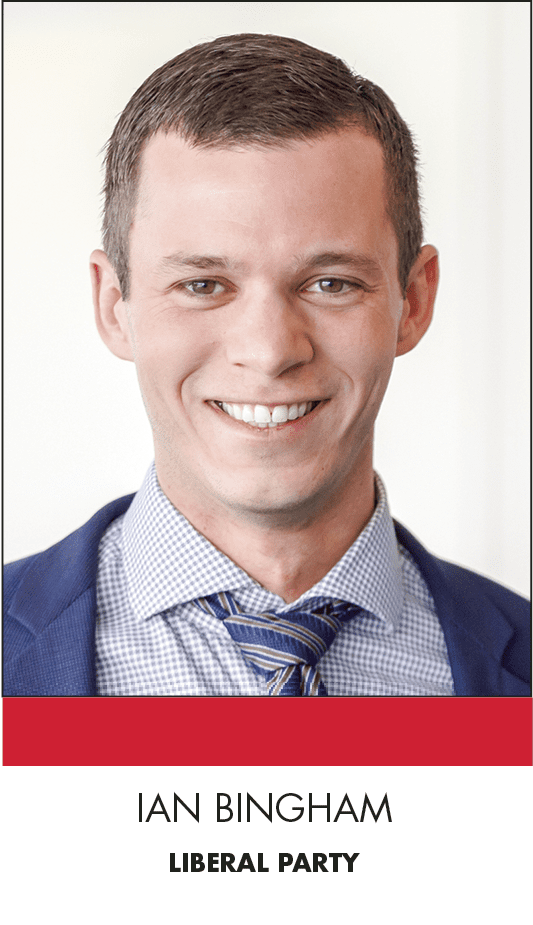 Ian Bingham, Liberal Party of Canada
Ian Bingham, Liberal Party of Canada
In knocking on over 10,000 doors, I am confident when I say the environment is the number one issue for you in Niagara West. Climate change affects every generation, from those who stand to inherit a broken ecosystem, to those who are passing on stewardship of this country to the next generation. I am proud that the Liberals have done more than any government in Canadian history to protect our environment, putting the same price on pollution that dozens of developed countries have already successfully used to reduce emissions. Coupled with the planting of two billion trees, and banning of harmful single-use plastics by 2021, we are well on our way as a nation to fulfilling our Paris Agreement targets (according to Greenpeace and Nobel Prize-winning experts), and becoming carbon-neutral by 2050. But no matter the issue, I hope to be able to serve this riding by working hard every single day as your voice in Ottawa.
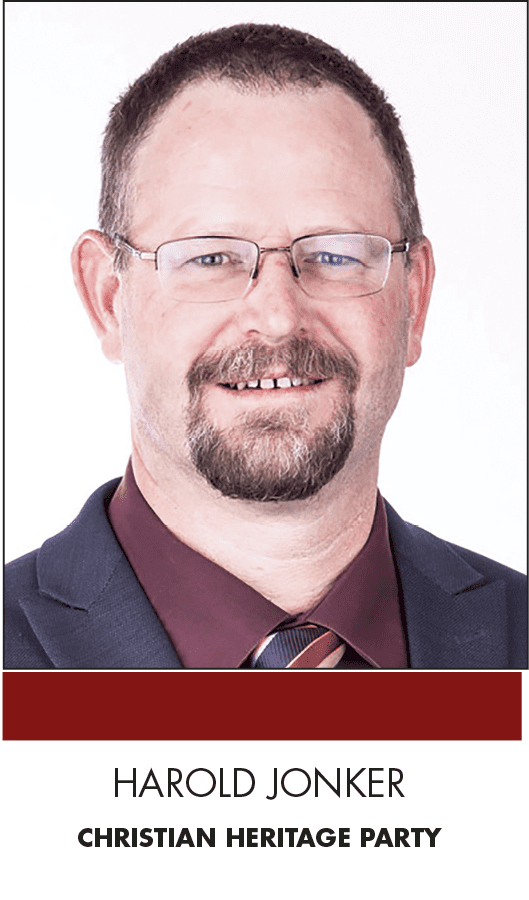 Harold Jonker, Christian Heritage Party
Harold Jonker, Christian Heritage Party
Niagara West, as well as the rest of Canada is facing a lot of issues when it comes to theories and ideologies! We as a society need to be better informed when it comes to abortion, the environment, what is real happening when it comes to climate change, and how much money we are wasting on interest when it comes to our debt. What needs to happen is that information from both sides of any debate be given equal opportunity to present to the public and that is not happening now. We need to protect the freedom of speech more, and our leaders are not doing this!
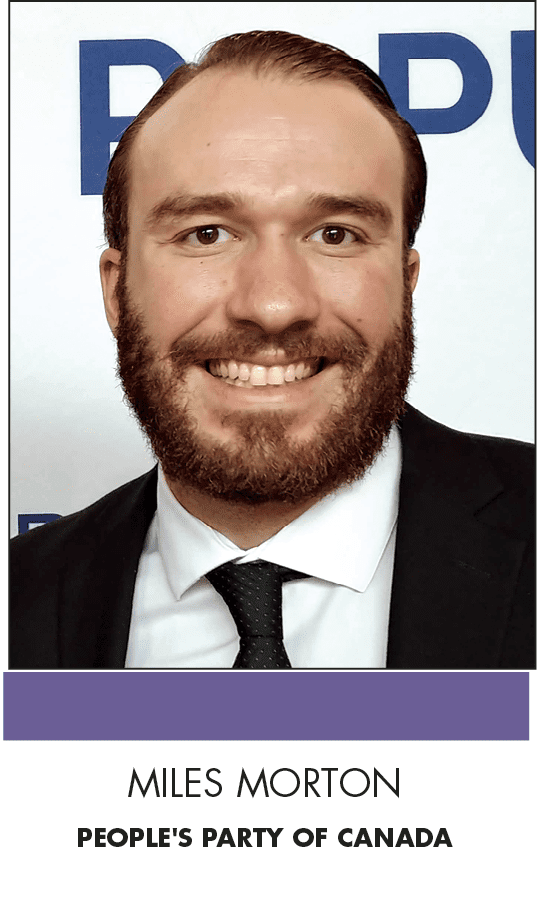 Miles Morton, People’s Party of Canada
Miles Morton, People’s Party of Canada
The most important issue for voters this election is the cost of living for middle class Canadian families. The People’s Party of Canada plans on addressing this issue by lowering taxes for all Canadians through simplifying the tax system into three tax brackets: the first $15,000 earned will be taxed at 0 percent; any income earned between $15,000-$100,000 will be taxed at 15 percent; and income earned over $100,000 will be taxed at 25 percent. We’re going to eliminate the capital gains tax, the carbon tax and all carbon pricing. We’re going to bring down the price of home internet and cellphone services by eliminating the CRTC, the telecom monopoly currently in place in Canada. We’re going to privatize Canada’s airports. Canada’s airline industry currently ranks 124th in the world in cost competitiveness, so bringing more competition into our airline industry will also save Canadians money by reducing travel expenses. Additionally, we’re going to eliminate supply management, which currently costs the average Canadian an extra $400-$600 every year on dairy, poultry and eggs. Further, we plan on cutting the inflation rate to zero.
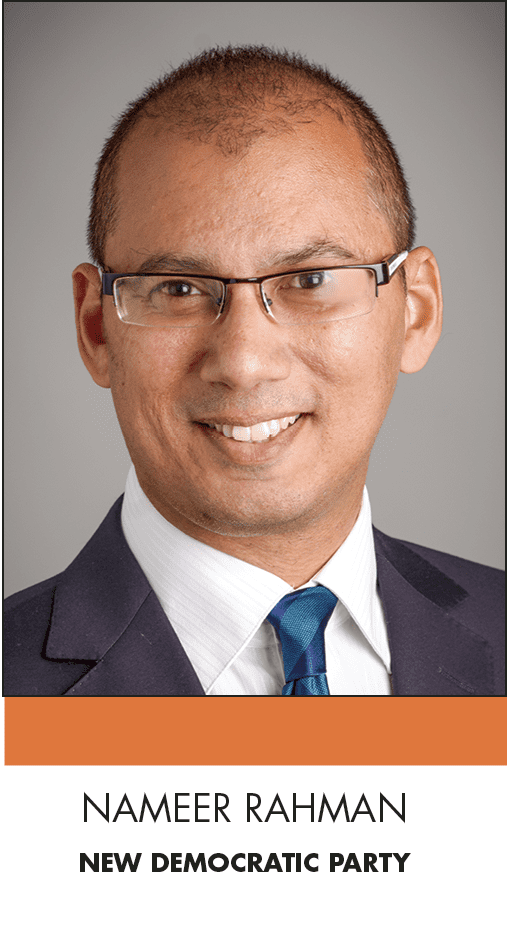 Nameer Rahman, New Democratic Party
Nameer Rahman, New Democratic Party
Affordability and the environment are two of the most important issues for Niagara West voters.
Precarious work, rising housing costs, lack of childcare facilities and the lack of health benefits have led to an affordability crunch that is burdening families and businesses. Fewer families have benefits and spend hundreds out of pocket for medication. Over a quarter of Niagara households are financially stressed paying housing costs. The high cost of childcare is preventing thousands of parents from returning to the workforce.
The environment in particular will have long-term impacts on the agricultural sector, especially on the tender fruit, grape and wine industries. Farmers will have to deal with greater risk when dealing with severe weather. This will also impact local communities from a housing and infrastructure standpoint.
The NDP will tackle the affordability by creating a national pharmacare program that will save Canadians an estimated $4.2 billion dollars, create 500,000 affordable housing units, fund 500,000 affordable childcare spots, and provide rental subsidies for those who are struggling. In addition, the NDP will create a $2 billion dollar climate emergency fund and support new risk management practices to ensure farmers are better prepared for climate change.
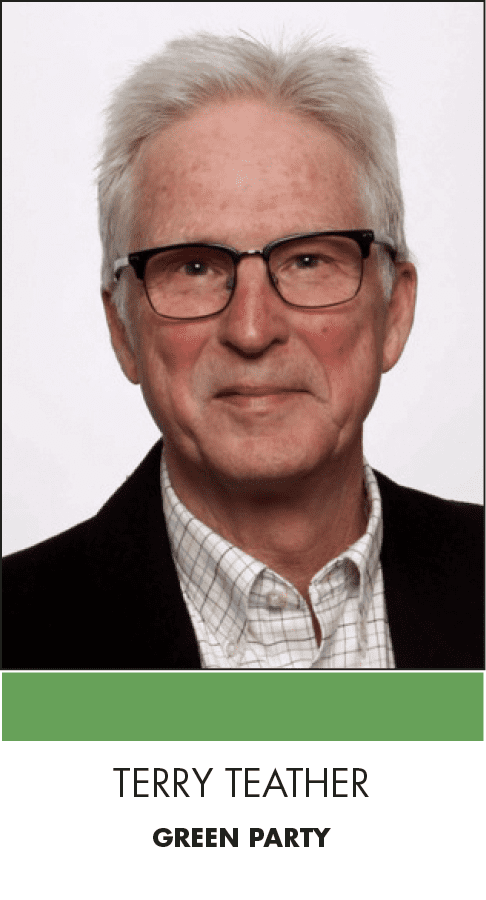 Terry Teather, Green Party
Terry Teather, Green Party
It is difficult to identify a single issue for Niagara West from homelessness, opioid addiction, mental health, housing costs… there are many. But I have heard from many seniors in Niagara West not just about their health but of the cost of living and protecting their income security. Seniors comprise a growing proportion of Canada’s population and even more so in Niagara West. The Green party have developed a National Seniors Strategy with a number of priorities. We would ensure the CPP remains robust and adaptive to changing needs and circumstances by increasing over time the target income replacement rate from 25% to 50% of income received during working years. We would protect private pensions amending the Bankruptcy and Insolvency Act and Companies’ Creditors Arrangement Act to establish the preeminence of pensioners and the pension plan in the creditor hierarchy during insolvency proceedings. Furthermore we would amend the Medical Assistance in Dying legislation to ensure everyone has the choice of dying with dignity. This includes allowing advance directives and guaranteeing the right to draw up a “living will.” Finally we would develop and fund a national dementia strategy to support research and improve the quality of life for patients caregivers.
Cannabis has been a major issue in Pelham over the last year. What do you do propose to mitigate residents' concerns of the side-effects from this, such as odour and light emissions?
Dean Allison
This is not just an issue in Pelham. The same issues are being faced in many municipalities in Niagara West and indeed right across the country. And they need to be addressed and resolved.
While the legalization of cannabis is here to stay, the Liberal government rushed to pass the legislation without doing due diligence in regards to standards for facilities. While Health Canada is responsible for the approval and inspections of commercial facilities, these inspections are only as good as the regulations. These regulations and standards need, and indeed must, be reviewed and changed.
The current level of odour and light emitted from current commercial facilities is unacceptable. A Conservative government would take the necessary steps to review and address this unacceptable situation by increasing the requirements.
In addition to the problems caused by licensed commercial operations, there is an even bigger problem with the illegal (co-op) growing operations that fall outside of any Health Canada regulations. These facilities must be dealt with by law enforcement and local by-laws.
For over a year, I and my staff have continually reached out to Health Canada and specifically the department responsible for cannabis.
Ian Bingham
I propose the following three solutions to this issue:
 (1) I will approach Health Canada for regulations on odour which will help municipalities craft nuisance by-laws, and support enforcement of “scrubbing” (air filtration). Technology already exists to “scrub” cannabis operations, so they do not produce odour, it is a matter of making sure they do so. Furthermore, I support the re-zoning of these operations to industrial designation, so that no further operations are constructed near residences.
(1) I will approach Health Canada for regulations on odour which will help municipalities craft nuisance by-laws, and support enforcement of “scrubbing” (air filtration). Technology already exists to “scrub” cannabis operations, so they do not produce odour, it is a matter of making sure they do so. Furthermore, I support the re-zoning of these operations to industrial designation, so that no further operations are constructed near residences.
(2) One of my goals for the riding is a new transit corridor from the Peace Bridge to Hamilton. This will not only alleviate traffic on Highway 20, and reduce urban sprawl in the Pelham area, but also create desirable, serviceable areas for industry such as cannabis operations to set up, well away from our homes.
(3) I believe that cannabis growth, particularly CBD oil, could become an international export, and that we in Niagara West should therefore create the jobs of the future by investing in innovation and export of this product, to increase sustainable growth in our riding.
Harold Jonker
As the CHP we would work to reverse the legalization of marijuana use, as even Canada Health’s own website shows that there are so many negative effects when people use it. This is a perfect example that our leaders are not concerned about our children’s future but in ways to increase government revenue. I would push the Department of Heath to do way more with dealing with the issues of odour and light emissions as they seem to be ignoring these concerns that come to them.
Miles Morton
I’m going to allow my constituents to be my voice in Ottawa on this issue. I encourage anyone to reach out to me and express their concerns. If the issue falls within the federal jurisdiction, I’m open to drafting and introducing a private members bill to voice your concerns. I’m not going to get elected and disappear, I’m running to be your voice in Ottawa.
Nameer Rahman
As with any new industry there are growing pains and unexpected side effects. I pledge to work with Health Canada, the provincial government, municipal governments, residents as well as the cannabis industry to ensure that the appropriate standards and safeguards are developed and implemented to deal with resident complaints. These solutions could be setback distances from urban areas, venting and filtration requirements and other technical solutions. Simply put, residents should not have to suffer and more needs to be done by all parties to find creative and effective solutions.
Terry Teather
This has become a perpetual problem thrust upon municipalities and towns who were largely unprepared because of insufficient or misinformation combined with a lack of revenue for monitoring and enforcement. Naturally neighbours to large industrial greenhouse cannabis facilities have reason to complain. Odour and light pollution seem to be pervasive. Pelham, Lincoln and Grimsby councils receive numerous complaints on an ongoing basis. Interim control bylaws such as Lincoln’s prohibiting cannabis cultivation or production are short term solutions. Furthermore ICBs are time consuming, have limited shelf lives and are expensive to monitor and enforce costing taxpayer dollars. Before opening, facilities need to ensure they provide municipalities with building plans illustrating how light and noise pollution will be circumvented through blacked-out facility adaptations, carbon odour scrubbers, gravel bed filters, misting systems or other modifications. Both upper levels of government must spend more funds on supporting research and development into odour free strains of cannabis.
Do you believe cannabis facilities should be taxed as an agricultural venture (as they currently are) or an industrial one?
Dean Allison
The taxation of all business must be fair and appropriate in relation to their profitability. In regards to taxation as it relates to property (zoning), while it is the responsibility of Health Canada to license the commercial production of cannabis, the business activities occur in local municipalities. It is up to each municipality to designate land use and zoning and as such, and in conjunction with provincial legislation, it is up to them to determine appropriate tax assessment.
Ian Bingham
As an industrial operation.
Harold Jonker
At the end of the day they do fall under the agriculture umbrella but it would be something that I would look into. There have been a lot of discussions in different municipalities that are looking to try to only allow cannabis facilities in only industrial areas but I believe that this would not be good for those that have to work in their proximity either. I would work very hard to make marijuana illegal again like it should be!
Miles Morton
I think it should be left as it is currently. When elected, the People’s Party of Canada will cut the corporate tax rate and farm tax by five percent each.
Nameer Rahman
I believe that cannabis should be taxed, zoned and treated as an agricultural venture and that cannabis edibles within the same framework for processed foods.
Terry Teather
Whichever way they are taxed, although relevant, may not provide a long term solution to the difficulties stated previously. The Ministry of Health has a direct responsibility and control to ensure all facilities operate in a manner that does not negatively impact the everyday lives of communities. A vehicle for consultation or a commission of all stakeholders including, but not limited to, federal, municipal, provincial and proprietors and owners must be struck to ensure a long term viable solution that is fair and equitable and that does not leave one party dealing with persistent industrial odour and light issues. Both the provincial and federal governments must provide financial support to increase the monitoring of such facilities and for those currently in operation and where required intervene and ensure municipalities are not left on the monetary hook. Tax revenue at the upper levels of government needs to be restructured to allow this to happen.
In terms of infrastructure projects in Niagara, what sticks out to you as an important concern in the short-to-medium term (1 to 5 years)?
Dean Allison
All municipalities in Niagara West need assistance in regards to infrastructure. As Niagara continues to become a more attractive place to live, work, raise a family, and retire, it is critical that we continue to improve, update and/or replace aging roads, bridges, water and sewer plus so much more.
Since first being elected I have had the opportunity to work with my conservative colleagues on bringing hundreds of millions of dollars to this region, including major infrastructure projects like additions to our border crossings here in Niagara which helped facilitate the flow of goods and services, the Niagara Falls convention centre, which brings in people from all over the world who often stay to visit all that Niagara has to offer, the Fleming Centre in Beamsville, the YMCA and wastewater treatment plant in Grimsby. There have been roads, bridges and parks in Pelham and West Lincoln, and renovations at the Wainfleet arena. There has also been funding for innovation at Brock, the Vineland research center and Niagara College, and continued support for our vibrant agriculture industry to name a few.
Ian Bingham
My answer is threefold:
(1) A new transit corridor (think: mid-peninsula corridor) to bring jobs, reduce urban sprawl in Pelham, reduce traffic on the QEW and Highway 20 and give cannabis operations a place to set up. As our riding is designated an International Trade Corridor, the federal government could chip in 50% of the cost of any such corridor. I would have to work alongside the province to achieve this, which I am happy to do. Political party is not important—let’s just get the job done.
(2) Rebuild West Lincoln Memorial hospital. Though Pelham wouldn’t benefit from this as much as more northern areas, this is a project which will help with wait times and give options for health care provision in our riding. The federal government could be levied to contribute to clean infrastructure when rebuilding.
(3) Public transit. This is a project which our seniors and youth desperately need to remain active, and so the Ministry for Seniors would be my starting point to seek funds for such a venture.
Harold Jonker
I know that as we continue to grow in population we will be faced with congestion issues when it comes to how much traffic is on our highways. We need to continue to push for the mid- peninsula corridor to be built and I would work on the federal level with all levels of government to move this project forward, and ensure that it does not become a toll road.
Miles Morton
The West Lincoln Memorial Hospital needs to be completely replaced. This does fall under the provincial jurisdiction. However, I will do everything I can to assist in the process of getting this project completed in a timely manner.
Nameer Rahman
Niagara health care infrastructure is probably the most important concern in the short to intermediate term. Ensuring that both the West Lincoln Memorial Hospital is built as well as the South Niagara facility will be critical to ensure that residents have close access to health facilities. In addition, mass transit systems, such as regular commuter service into Niagara as well as ensuring previously planned stations, such as the Grimsby GO station will be critically important to ensuring Niagara is connected economically to the rest of Ontario. To these ends, an NDP government will look at additional capital funding support for mass transit and health infrastructure in Niagara and across Canada.
Terry Teather
The expansion of rail and light rail and electric vehicle charge stations will provide both environmental and transportation benefits to all communities of Niagara. A pervasive transportation infrastructure will benefit industry, tourism and the environment. Currently the limitation of the GO train to one arrival and departure per day, at terrible hours I might add, appears to be the product of insufficient track allowance. Building an extended and versatile electric rail infrastructure that can provide greater opportunity for the transportation of goods and people is vital. Greens would institutionalize federal transfers to municipalities though the creation of a Municipal Fund, renaming the Gas Tax funds, which were delinked from gas tax revenues years ago. We would ensure a doubling of current funding to ensure predictable and reliable funding to municipalities. We would allocate 1% of GST to housing and other municipal infrastructure projects on an ongoing basis to provide a consistent baseline of funding. Finally we would make changes to the Canada Infrastructure Bank to reduce interest rates to municipalities on loans for infrastructure projects. Niagara West will be improved by more sustainable infrastructure through investment of more federal funds.
In your view, what is the single most important concern nationally, and where do you and your party stand on it?
Dean Allison
Easy answer. Affordability and the economy.
If we are to have a stronger Canada, we must get our finances back in line. We cannot continue to run deficit after deficit after deficit. The budget will NEVER balance itself.
The reality of deficits is that you need to pay them back. Which means eventually everyone will pay more in taxes in order to do that. There is only one source of revenue, and that is you, the taxpayer.
There are a number of things that a Conservative government will do when elected. Our government will protect our healthcare system and guarantee increased funding, will protect our environment while removing the carbon tax, and will provide more money for families, children, seniors, and small business.
The bottom line is that a Conservative government wants to put more of your hard earned tax dollars back into your pocket and strengthen this great country.
Ian Bingham
Affordability, the environment and the national debt are neck-and-neck. When it comes to affordability, the Liberal government has lowered taxes on the middle class, started a national housing strategy, increased the first-time homebuyers incentive to 10%, and will cut cellphone bills by 25%. We now, thankfully, finally have a plan for the environment, so long as we stay on track. Finally, when it comes to national debt, let us not forget that 70% of our debt is owned by Canadians (i.e., you, the taxpayers) and not foreign investors. But just as one would not worry about the mortgage when the house is on fire, neither can we focus on paying off debt when we are at the doorstep of climate change, Affordability crisis, and a senior “baby boomer” bubble moving through the system. When your tax dollars are wisely invested in families, such as the CCB, increased seniors pensions, reduced day care costs and increased grants to students, then repaying the debt will be far easier. We know this works because after four years of Liberal government, we have the lowest unemployment rate in Canadian history, and the lowest debt-to-GDP ratio of any G7 country.
Harold Jonker
The most important concern nationally to me and I can dare say for the CHP is the abortion issue! What has been presented to us and our society on this issue is very concerning. Woman do have a choice in their lives that they can make about not having children. But as soon as they are pregnant there are now two lives to consider, two rights. So many people will argue that it is about the woman’s choice and their rights but firstly there are now two peoples. Not only that but there are so many negative effects on having an abortion that women need to be given those facts before getting an abortion and they are not receiving it! Please watch “HUSH, a Liberating Conversation About Abortion and Women’s Health,” so that as Canadian we can be better informed. It was a documentary that was tough to watch and made me sad but if we care about women we need to!
Because if this information and so much more I and the CHP are against abortion!
The CHP will stand up for Life, Family and Freedom!
Miles Morton
The most important issue is balancing the budget and getting our finances in order. We’re the only party promising to balance the budget within one term. We’re going to balance the budget in two years without any cuts to social services by: eliminating corporate welfare and government subsidies for corporations ($29 billion), defunding the CBC and eliminating any government funding for the mainstream media ($2 billion), reducing immigration from 350,000 to between 100,000 – 150,000 ($20 billion) and drastically reducing foreign aid ($5 billion). These changes will allow us to balance the budget and give all Canadians a generous tax cut.
Nameer Rahman
The single biggest national issue right now is probably the environment. Climate change is impacting Canada from coast to coast to coast. Retreating ice floes up north and severe coastal erosion is endangering aboriginal communities. Rapidly melting glaciers are threatening Alberta’s river systems and drinking water. Warm or erratic winters will jeopardise Niagara’s ice wine and tender fruit industry. Severe weather will impact everything from insurance costs to municipal infrastructure.
The NDP climate change initiatives look at both mitigating climate impacts and preventing future impacts. On the mitigation side, the NDP will create a $2 billion dollar climate disaster fund. To prevent future climate impacts Canada has to do its part in ensuring global temperatures do not rise more than 1.5 degrees. To do that, the NDP will reduce Canada’s GHG emissions to 450 megatonnes. This will require measures to ensure heavy emitters pay through carbon pricing, homes are retrofitted for energy efficiency (saving $900 per year in energy costs), make it is easier to buy electric vehicles and support initiatives like mass transportation. Investing in the green economy should create an estimated 300,000 jobs across Canada.
Terry Teather
Climate change.
The science indicating we must limit carbon output is overwhelming. There can be no denying that without immediate and pronounced change the country, and earth, we inhabit today will be changed forever. Our very survival as a species, over the century, may be at stake. Canada is in a unique position of being able to lead the world by showing that change can happen. Limiting our GHG emissions by at least 60% by 2030 over 2005 levels is imperative. The era of oil and gas is rapidly coming to an end and we must justly transition the workers in that industry to a growing and vital green economy which will provide job opportunities for hundreds of thousands of workers. This will include industrial expansion in areas of home retrofit, clean energy and electric grid and transportation infrastructure. No more pipelines need to be built, subsidies to oil and gas industry must end, fracking ceases and capital saved is invested in ways that do not degrade the environment. Greens worldwide share this vision. The Green “Mission Possible” plan will ensure we meet the goals. Consider a vote for future generations.

Following the open-ended questions, candidates were presented with a series of statements and asked to rate their level of agreement or disagreement with them. In each case, 1 represented agreeing LEAST or not at all, and 5 represented agreeing MOST or completely. Candidates were also invited to add brief explanatory comments, if desired.
I think that Canadians should be covered by universal pharmacare.
Dean Allison 5
While it is important that every Canadian should be fully covered under our medical system, it is important to realize the costs involved in a pharmacare program. According to the parliamentary budget officer, it will cost an additional $25 billion a year to fully implement, and these costs must paid for by the Canadian taxpayer. We should look for the gaps in people’s coverage and fix them as there are a number of programs already in effect.
Ian Bingham 5
Harold Jonker 1
Miles Morton (No numeric answer)
We’re going to leave matters such as universal pharmacare up to the provincial government to mandate. We’re going to eliminate transfer payments from the federal government to fund healthcare without decreasing overall public healthcare funding. We’ll do this by eliminating the GST and allow the provinces to occupy that fiscal room. We also wish to bring private investment into our healthcare system to take some of the strain off of the public healthcare system.
Nameer Rahman 5
Lack of benefits and rising drug costs impact affordability for Canadians. The NDP pledges to bring in a National Pharmacare Program, which will be modeled on the existing Health Act provisions. A pharmacare program will save Canadians an estimated $4 to $5 billion dollars annually. The average household will save $500 annually, while businesses will save up to $600 per employee. The NDP government will invest over $10 billion dollars into the program. However the program will have to be negotiated with the provincial governments to ensure that corresponding commitments are met and achieved.
Terry Teather 5
I think that Canadians should be covered by universal dental care for all but cosmetic procedures.
Dean Allison 5
In a perfect world, full medical and dental coverage would be a best-case scenario, but once again this would need to be paid for by Canadians. Revenues for the government to pay for all programs and services come from each of us.
Ian Bingham 3
I agree, however in speaking with voters at the doors, this increase in spending is not something Canadians are ready for at this point.
Harold Jonker 1
Miles Morton (No numeric answer)
This falls under the provincial jurisdiction. I’m running for MP, not MPP. We need to respect the constitution and stop meddling.
Nameer Rahman 5
Yes, Canadians should be covered by a universal dental program that [covers] a minimum range of expenses. The NDP is proposing to cover basic dental coverage for households with a combined income below $70,000. The coverage will include preventative and restorative measures including exams, cleanings and treatments such as filling, crowns and root canals. The program is estimated to cost approximately $800 million dollars annually.
Terry Teather 3
I think that women have a moral right to decide what to do with their bodies, including whether to have an abortion.
Dean Allison 5
I have always been and will remain pro-life. The legal issue of abortion has long been settled and the Conservative party has said it will not be reopened.
Ian Bingham 5
Nobody is “pro-abortion,” however the right to abort is strongly tied to equality and women’s rights. The Supreme Court decided unequivocally that this complex and difficult decision must be left to the woman making it, and I stand by the rule of law and Section 7 of the Charter of Rights and Freedoms.
Harold Jonker 1
Miles Morton (No numeric answer)
I believe that abortion should be strictly regulated by the government. As is the case in the majority of developed western nations. Two thirds of Canadians support some kind of abortion regulation in the final trimester.
Nameer Rahman 5
Terry Teather 5
I think that fetuses should be protected by the state, and that abortion should either be restricted or entirely prohibited.
Dean Allison 5
I have always been and will remain pro-life.
Ian Bingham 1
Harold Jonker 5
Miles Morton (No numeric answer)
I completely agree, the unborn need to be protected by the state. Unlike the Conservative Party of Canada our party allows us to introduce private members bills on abortion. I’ve made a commitment to support or introduce the Protection of Preborn Children Act.
Nameer Rahman 2
Abortion and family planning options should be left between a woman and her doctor/health practitioner with the final decision to be made by the woman. The expectation is that informed decisions would be made by the woman and that a full range of options presented by the medical practitioner as per commonly accepted ethical guidelines.
Terry Teather 1
I think that LGBTQ people should enjoy the same rights, protections, and respect as all other Canadians.
Dean Allison 5
All Canadians should be treated equally, no matter their race, religion, or sexual orientation.
Ian Bingham 5
It is surprising that, in 2019, this question is still being asked.
Harold Jonker 1
But what people do in their bedroom that we disagree with does not give us the right to abuse them. The LGBTQ has been very aggressive in getting their lifestyle accepted by society when many studies show that it is not a healthy one! Men who want to be women and have tried to make that happen should not be allowed in the women’s public washrooms for the sake of our women’s rights. Studies repeatedly show that children raised by their father and mother live a healthier life and this needs to be promoted.
Miles Morton (No numeric answer)
I believe in the equal treatment of all Canadians. I completely reject identity politics and any attempt to divide Canadians based on their sexual orientation, race or gender.
Nameer Rahman 5
Absolutely. No question about it.
Terry Teather 5
I think that Indigenous groups should be allowed to opt out of the Indian Act.
Dean Allison 5
Indigenous peoples should be allowed to opt out of the Indian Act but must then be treated fairly as all Canadians are.
Ian Bingham 5
Harold Jonker 5
Miles Morton (No numeric answer)
The Conservatives and Liberals have both failed our Indigenous communities. In 2019, we have First Nations communities without clean water, no high schools, no reliable power source and no access to adequate medical treatment. A People’s Party of Canada government will dismantle the Indian Act and eliminate the water crisis. Our first priority when elected will be providing every community in Canada with clean water. We’re going to put our own citizens first. We’ll strive to create a new relationship with our Indigenous communities based on mutual respect, fairness and personal responsibility.
Nameer Rahman 3
The purpose of reconciliation is to establish mutual and respectful [ties] between aboriginal and non-aboriginal peoples in Canada. Reconciliation is not about whether someone is “in” or “out” of the Indian Act—though I support those who wish to “opt out” of the Indian Act. More substantively, reconciliation will require following the lead of Indigenous peoples in the form and substance of what is required. This will include recognizing treaties, acknowledging rights and titles, supporting identity and beliefs and fighting systemic racism. The Indian Act is severely flawed, and moving forward is much more than simply stepping in or out of it.
Terry Teather 5
Canada should enshrine the tenets of the United Nations Declaration on the Rights of Indigenous Peoples into law.
Dean Allison 1
As far ad the UN declaration is concerned, by Canada accepting this, the government is giving the UN the right to intervene in Canada’s laws, which is unacceptable.
Ian Bingham 5
I believe that the declaration should indeed be made law, and any act that stands in the way of improving quality of life of Indigenous people should not be mandatory. I am proud that the Liberal government has lifted 87 boil-water advisories, and will lift the remaining 52 if given a second mandate. Moreover, 400,000 people on-reserve have had housing improved over the last four years. Many of my clients in the justice system are Indigenous and continued funding in programmes, employment opportunity and family-building is the best way to help those traumatized by the residential school system.
Harold Jonker 1
Miles Morton (No numeric answer)
The United Nations is a dysfunctional organization, some of the world’s worst committers of human rights violations sit on the United Nations Human Rights Council. We will not take any advice from the United Nations on how to govern our country. The People’s Party of Canada will immediately pull Canada out of any UN agreements which limit our sovereignty, including the Paris Climate Agreement and the Global Compact on Migration.
Nameer Rahman 5
Yes, Canada should enshrine the tenets of UNDRIP into law a part of reconciliation process.
